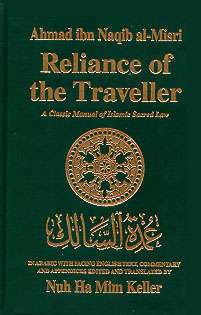Reliance of the Traveller
 Reliance of the Traveller, translated by Nuh Ha Mim Keller | |
| Author | Ahmad ibn Naqib al-Misri |
|---|---|
| Translator | Nuh Ha Mim Keller |
| Language | Arabic |
| Subject | Shafi'i Fiqh |
| Publisher | Amana publications. |
| Pages | 1232 |
| ISBN | 978-0-915957-72-9 |
'Umdat as-Salik wa 'Uddat an-Nasik (Reliance of the Traveller and Tools of the Worshipper, also commonly known by its shorter title Reliance of the Traveller) is a classical manual of fiqh for the Shafi'i school of Islamic jurisprudence. The author of the main text is 14th-century scholar Shihabuddin Abu al-'Abbas Ahmad ibn an-Naqib al-Misri (AH 702-769 / AD 1302–1367). Al-Misri who based his work on the previous Shafi'i works of Imam Nawawi and Imam Abu Ishaq as-Shirazi. Ibn Naqib follows the order of Shirazi's al-Muhadhdhab (The Rarefaction) and the conclusions of Nawawi's Minhaj at-Talibin (The Seeker's Road). This work consists of the soundest positions of the Shafi'i school.
Contents
A. Sacred Knowledge (pg. 1) B. The Validity of Following Qualified Scholarship (pg. 15) C. The Nature of Legal Rulings (pg. 27) D. Author's Introduction to 'Umdat al-Salik (pg. 47) E. Purification (pg. 49) F. The Prayer (pg. 101) G. The Funeral Prayer (pg. 220) H. Zakat (pg. 244) I. Fasting (pg. 277) J. The Pilgrimage (pg. 297) K. Trade (pg. 371) L. Inheritance (pg. 460) M. Marriage (pg. 506) N. Divorce (pg. 554) O. Justice (pg. 578) P. Enormities (pg. 649) Q. Commanding the Right and Forbidding the Wrong (pg. 713) R. Holding One's Tongue (pg. 726) S. Delusions (pg. 777) T. A Pure Heart (pg. 796) U. The Gabriel Hadith (pg. 807) V. Belief in Allah and His Messenger (pg. 816) W. Notes and Appendices (pg. 826) X. Biographical Notes (pg. 1019) Y. Works Cited (pg. 1116) Z. Indexes (pg. 1128)
Keller translation
The book was translated by the American Muslim scholar Nuh Ha Mim Keller in 1991 and became the first translation of a standard Islamic legal reference in a European language to be certified by Al-Azhar.
Nuh included three introductory sections before the main work to form a user's guide to fiqh, as well as eight major appendices after the main work that consist of various topics, ranging from personal ethics and character to Islamic spirituality, for example traditional Islamic Sufism, and tenets of faith, and other famous classical Islamic texts such as Al-Ghazzali's Ihya’ ʿulum al-din and Nawawi's Riyadh as-Saaliheen. There is also a biographical section that lets the readers know who the figures mentioned throughout the book's legal texts are.
Certain sections of the book were left untranslated (although the original Arabic text is retained), as Nuh considered them irrelevant to modern societies. These parts include a section on slavery, describing the rights and duties of slaves and their masters, as well as some smaller sections such as, for example, a discussion on fixing utensils using gold.
See also
References
- Keller (ed., trans.), Nuh Ha Mim (1997). Reliance of the Traveller: Classic Manual of Islamic Sacred Law. Amana Publications (revised edition). ISBN 978-0-915957-72-9.
|